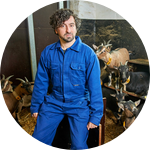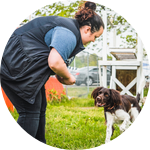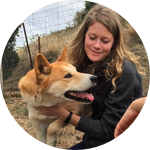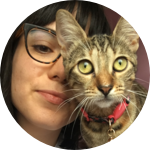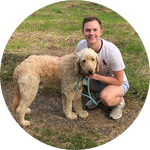About This Project
At the Thinking Dog Center, we investigate how dogs interpret the world around them. We've been asking the question "are dogs susceptible to illusions?" The goal of this project is to involve community scientists, and their furry friends, in at-home illusion experiments to help us answer this question, and also to study citizen science data quality and generalizability in dog cognition.
Ask the Scientists
Join The DiscussionWhat is the context of this research?
Domestic dogs play many vital roles in human lives, however, relatively little is known about how they perceive their environment (Byosiere et al., 2017). While illusion susceptibility has been used as a unique method of evaluating perception across a variety of species, this approach has only recently been adapted to domestic dogs (Byosiere et al., 2020). Current studies of illusion susceptibility in dogs are limited by small sample sizes and extensive training procedures. This project aims to involve community scientists, and their furry friends, in at-home illusion experiments to not only evaluate whether dogs are susceptible to illusions and also to study the data quality, and generalizability of community science.
What is the significance of this project?
The implications of this research are substantial: 1) By evaluating canine susceptibility across various illusions it is possible to interpret similarities and differences underlying perceptual processing which can be compared and contrasted across species 2) Additional studies of illusion susceptibility, in a larger sample of dogs consisting of a variety of different breeds, personalities, ages, temperaments and more, allow us to ask and answer questions beyond what is feasible at on-site canine cognition centers. 3) Investigating whether the results of community scientists generalize to previously conducted experimental designs can help us study the metascience within the field of canine cognition.
What are the goals of the project?
We aim to conduct a study of illusion susceptibility in pet dogs utilizing a community science based approach. We will collect data from as many dogs as possible within a 3-4 month data collection phase. Interested guardians will answer a series of demographic questions (e.g. dog age, dog sex, breed) using an online survey. After completing the survey, dog-guardian pairs that qualify to participate in the study will receive a specific set of instructions regarding how to conduct the illusion experiment at home. In general, this will involve the owner presenting a stimulus and videotaping their dog's reaction. The research team will review the videos and code the dog's behavior evaluating the dog's illusion susceptibility.
Budget
The items included in this budget are necessary for conducting this research, and doing it well! To ensure the proper stimulus presentation we will need to professionally print and mail stimuli to interested dog-guardian pairs. To combat attrition we will offer the chance to win a $50 gift card to a dog-related merchandiser upon completion of the study. To host the study and collect data we require funds for covering the costs of the website as well as data storage. In order to support the students working on this project, research assistant support at $15/hour is needed to help set-up the project, collect the data, code the data, and publish the findings. Finally, as this project represents a community science endeavor, we would like the results to be available to any and everyone interested. For this reason we are requesting funds to cover the cost of making this research open access.
Endorsed by
 Project Timeline
Project Timeline
This project will be completed within 1.5 years of being funded. This will be a collaborative project with my research group at the Thinking Dog Center at Hunter College, CUNY. This project has not yet been started, however, we have expertise in both the area of dog illusion susceptibility and citizen science.
Nov 30, 2020
Project Launched
Feb 01, 2021
Initial Project Set-Up and Preparation
Mar 01, 2021
Pilot Testing - Trial Project
May 12, 2021
Release Project to Citizen Scientists
Sep 30, 2021
Close Project to Citizen Scientists
Meet the Team
Affiliates
Affiliates
Affiliates
Team Bio
Sarah, Gabriella and Mikey are all active members in the field of dog behavior and cognition. The decision to conduct this project stems from a past collaboration where Sarah and Gabriella conducted a citizen science project called "If I Fits I Sits" which evaluated cat susceptibility to illusory contours!
Please follow this link for a detailed overview of our team at the Thinking Dog Center.
Sarah-Elizabeth Byosiere
I am the Director of the Thinking Dog Center at CUNY Hunter College where I study the behavior and cognition of domestic dogs and other canids. I began my career at the University of Michigan where I evaluated the function of the play bow in adult pet dogs. Since, I've worked as a research assistant for various canine cognition and behavior research groups including the Duke Canine Cognition Center, the Clever Dog Lab and the Wolf Science Center. I completed my PhD at La Trobe University in Australia under the supervision of Dr. Pauleen Bennett and the Anthrozoology Research Group. My dissertation focused on evaluating whether or not dogs are susceptible to visual illusions. The findings from these studies have been published in peer-reviewed scientific journals, presented at conferences, and have been featured on NPR’s Science Friday, The New York Daily News, Gizmodo, and CuriosityStream. You can find a recent invited presentation (Summer 2020) for the American Psychological Association here! In my spare time, I enjoy traveling with family and seeing the world. Although, at present, I am taking advantage of the extra time I have at home with my pets!
Gabriella Smith
I am a 2020 ABC Hunter Master’s Program alumna thrilled by animal cognition! I have experience studying octopus cognition, conducted my thesis studying contrafreeloading in African Grey parrots, and recently performed a citizen science study on optical illusion susceptibility in cats.
I am passionate about incorporating curiosity, creativity, and scientific inquiry in my work. I look forward to conducting citizen science to study illusion susceptibility in dogs!
Michael Bogese
I started my career in animal cognition at Yale University's Canine Cognition Center in 2015. While there, I aided in a variety of projects with questions including theory of mind, social learning, physical cognition, emotion, and domestication. My own research includes questions about how dogs experience their environments, specifically, how domestication may have altered the tools dogs use to investigate their world. As a current Masters Student in the Hunter College Animal Behavior and Conservation program, I am excited to continue learning about the perception of domestic animals, starting with this project!
Project Backers
- 16Backers
- 16%Funded
- $860Total Donations
- $53.75Average Donation



